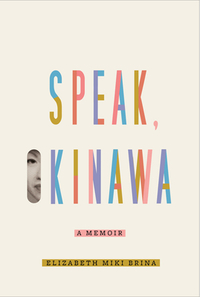Take a photo of a barcode or cover
adventurous
challenging
emotional
reflective
medium-paced
I was pretty engaged from the start of the book. Unfortunately, I just found myself getting a little nauseous re: the bodily violence committed in acts of war as well as descriptions of intimate partner violence. This coupled with so so much internalized racism and misogyny made this really difficult for me to continue.
Graphic: Addiction, Bullying, Misogyny, Racism, Sexual violence, Suicide, Torture, Colonisation, War, Injury/Injury detail
I picked this book up because I lived in Okinawa for three years and knew some of the charged history between Okinawa and the US. I was in my early teens and pretty sheltered until I moved there, so it was pretty eye opening to read about some of the stuff in this book. I went to a lot of the places she mentioned and have fond memories about all of it. But seeing it through her (or their) eyes was definitely something I am glad I did.
That being said, the author was so spoiled and mean that it was a big pill to swallow through most of the book. I know we all have our angsty tween and teen years, and obviously layering on systemic racism and dealing with that brings out another layer I am not privy to, but it was still really hard to see how she treated her mother and how she idolized her father. Towards the end she tries to make amends, which I was very happy to see, but my heart broke for her mother. Being away from her homeland, not being around anyone that speaks Japanese, feeling the animosity from her daughter (and husband???). Gosh it broke my heart.
That being said, the author was so spoiled and mean that it was a big pill to swallow through most of the book. I know we all have our angsty tween and teen years, and obviously layering on systemic racism and dealing with that brings out another layer I am not privy to, but it was still really hard to see how she treated her mother and how she idolized her father. Towards the end she tries to make amends, which I was very happy to see, but my heart broke for her mother. Being away from her homeland, not being around anyone that speaks Japanese, feeling the animosity from her daughter (and husband???). Gosh it broke my heart.
“He turned to us and said “Nuchi du takara.” Life is precious.
He didn’t want us to fight to save him. He didn’t want us to risk our lives for him.
The phrase is now our motto, our moral code. We believe in the sanctity of life, that life itself, above all else, above any proposed ideology or reason of excuse, must be cherished. We worship life. We worship peace. Yet wars still come to us.”
This is a beautiful memoir. Elizabeth’s story and her parents story is one that I’m so glad she shared with the world. I don’t think that most of us know enough about the history of Okinawa and what the American’s did to it and how Japan ostracized it.
He didn’t want us to fight to save him. He didn’t want us to risk our lives for him.
The phrase is now our motto, our moral code. We believe in the sanctity of life, that life itself, above all else, above any proposed ideology or reason of excuse, must be cherished. We worship life. We worship peace. Yet wars still come to us.”
This is a beautiful memoir. Elizabeth’s story and her parents story is one that I’m so glad she shared with the world. I don’t think that most of us know enough about the history of Okinawa and what the American’s did to it and how Japan ostracized it.
4.5 stars
Raw, heartbreaking, so full of regrets and what-could-have-beens, but ultimately hopeful. Very well written and appropriately critical of the United States’ use and abuse of Okinawa and its people.
Raw, heartbreaking, so full of regrets and what-could-have-beens, but ultimately hopeful. Very well written and appropriately critical of the United States’ use and abuse of Okinawa and its people.
Like the author, my mom was born in the 40s in Okinawa, married and American soldier, and moved away from her family and home. It was wild to read the memoir of someone with so many similarities. My relationship with my mom was maybe not as fraught as the author’s, but it was total therapy to see someone with a similar universe convey the difficulty of having a parent with language and cultural barriers. I didn’t know the severity of my mother’s poverty and her trauma of being a child during war time until I was much older. This book will stay with me for a long time for personal reasons, but anyone who loves memoirs will enjoy this book too.



